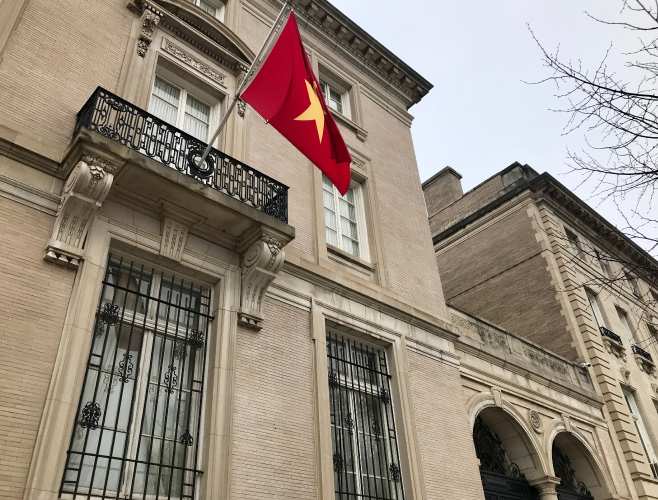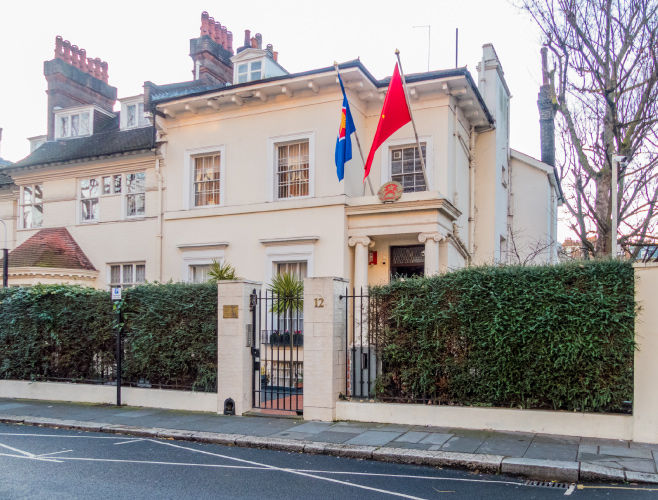What are the differences between Consulate and Embassy in Vietnam?
Embassies and consulates are vital authorities established by governments worldwide to maintain a high degree of connection with other countries. Although these diplomatic missions are located in foreign countries, they are under the authority of the country they represent rather than the authorities of their host.
When you want to apply for a visa to enter a country such as Vietnam, you typically hear about submitting your application to the nation's Embassy or Consulate. So, what is the Embassy? What is a Consulate? Why does it have the capability of granting a visa to an applicant? Let’s keep reading the article below to learn more about the differences between an embassy and a consulate in Vietnam.

The differences between Consulate and Embassy in Vietnam
What is an Embassy?
The Embassy is a diplomatic entity created by one country in another when two countries have diplomatic relations and agree to establish diplomatic organizations. The Ambassador is the head of the Embassy, followed by Counselor, Secretary.
It is always located in the country's capital. As a result, all other nations' embassies in Vietnam have locations in Hanoi, and the Embassy of Vietnam is always located in the capitals of neighboring countries.
Embassies are the primary means of contact between two foreign jurisdictions. They are responsible for essential government responsibilities such as establishing treaties between two nations and arranging state visits by high-ranking officials.
What is a Consulate?
Consulates serve as an additional diplomatic mission to another country. It represents its country to the people of the host country. The Consul General is the head of the Consulate, under the role of the Ambassador.
A consulate, albeit less significant than an embassy, provides a variety of responsibilities and services for its citizens abroad in the host country and foreign nationals.
While most nations maintain at least one embassy in another country, they may have consular offices elsewhere. Consulates are often created as additional diplomatic presence in more significant nations, in locations other than the capital that are essential tourist, economic, or financial hubs.
Distinguishing an Embassy and a Consulate
In contrast to having several Consulates in numerous cities, a country will only have one Embassy in another. That entails that the Embassy manages the Consulate. The Ambassador is the head of the Embassy, overseeing the nation's politics, economics, culture, visa policies, etc. The Ambassador reports to the host country's Ministry of Foreign Affairs.
Consulates deal with minor diplomatic matters, while the Embassy handles serious ones. The Consulates' main task is handling visa and passport issues and those involving tourists and expatriates. In addition, the key role of the Consulate is to promote trade by assisting import and export between the two nations and assisting enterprises in the host country to invest in its country and vice versa.
In contrast, the Embassy will tell its government of any significant social, political, military, economic, and other events occurring in the host country. On the other hand, the Consulate reports noteworthy deaths, births, weddings, and other events to its government.
The Embassy is responsible for drafting treaties between the two countries and organizing official visits. The Consulate is also in charge of advising its citizens of any security issues. Care for its citizens who are in custody or under arrest is the duty of consulates.
Although the Embassy and the Consulate of Vietnam represent their governments abroad, their duties and functions differ.
Understand more about the Role of Travel Visa and the Difference Between a Visa and a Passport

Applying for a Vietnam visa at the Consulate or Embassy
Apply for a Vietnam e-visa at the Vietnam Embassy to enjoy this naturally beautiful country
Visitors can apply for a Vietnam visa at the Vietnam Embassy by going to the Vietnam Embassy in the host nation. If your country doesn’t have a Vietnam Embassy, you can also apply at the Vietnam Consulate. You can contact your country's Embassy in Vietnam if you are here and are facing any issues with your travel documents or visa.
Currently, Vietnam's e-visa allows more than 80 countries worldwide to enter with many different purposes. You can check the requirements here to learn more. On the other hand, citizens of ineligible countries for an e-visa must visit the nearest Vietnamese Embassy or consulate in their country to apply for a regular visa if they wish to visit Vietnam.
Its history and culture are as intriguing as the vistas that decorate this unique country. Get a travel visa to experience the country's charms for yourself. The Vietnam Immigration Services makes it simpler than ever to apply for a visa online.
You may submit your Vietnam visa application from anywhere globally, thanks to the simplicity and effectiveness of the online system. You may obtain your travel permit and open the doors to Vietnam's enthralling world of history, natural beauty, and culture with just a few easy steps.
Related Articles
- Custom In Vietnam: A deep dive into Vietnamese traditions
- Retire in Vietnam: The ultimate guide for a dream retirement
- Trang An, Vietnam: A journey through Vietnam's natural wonder
- Vietnam Metro: The future of urban transportation in Vietnam
- Main districts of Ho Chi Minh city: Iconic landmarks & travel map
HOW CAN WE HELP?
APPLY WITH CONFIDENCE










